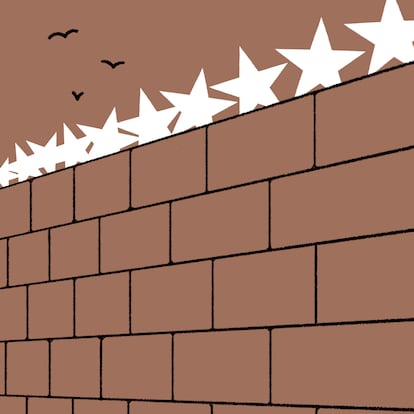An American ugliness
The US criminal system is a gulag of cruelty and poverty that crushes human beings

The sad truth about this new, crass and repressive face of the United States is that it’s not new at all. It’s always been there, like the dark side of the Moon, even if no one sees it. It’s difficult to see because our gaze is blinded by the glitter of wealth and power, fueled by the overwhelming propaganda that rains down on us incessantly, at any hour of the day or night, in movies, on television, on street billboards, in the millions of mirages of social media.
Virtually all the most successful films and series are American, and they impose their insolent supremacy over distribution channels and consciences, which barely receive any other visual messages, any other fictions not governed by the same aesthetics and values. On the sides of bus stops, there’s almost always a poster for an American movie featuring a superhero with muscles decorated with stars and stripes, or a policeman brandishing a pistol, or a thug in a torn T-shirt armed with a futuristic machine gun. On television channels, including Spanish Television’s La 1, all the films shown at night are melodramas about well-off people living in grassy residential estates, or police or science fiction stories that have in common extreme visual effects and a permanent celebration of violence, cars, helicopters, firearms, all seasoned with robotic dubbing in which the poor Spanish language is twisted and disfigured until it becomes a pathetic carbon copy of English.
At the beginning of his term, the evanescent Minister of Culture expressed his intention to decolonize Spanish museums. I would recommend that, while he is at it, he undertake a much more difficult decolonization, that of Spanish culture, life, and language. We admire and copy that other world, mimicking it as subjects of an imperial power, and in reality, we don’t even know what it’s like. We know what high schools are like with the flag in the classrooms and the lockers in the hallways, we know what family Thanksgiving and Christmas dinners are like, we know about the soldiers returning from war in custom-made uniforms, and cheerleaders on the sidelines of U.S. football stadiums.
And since all of this seems to us a more attractive and an almost truer reality than our own, we cannot imagine to what extent it is all a grand stage set, a performance put on by people trained since childhood to interpret themselves and to avoid seeing what, for them, it is better not to see: on the one hand, the fragility or the pure lie of the fictions of enthusiasm and success that the vast majority reveres like a religion; and, on the other, the brutality and darkness that are only a step away from the luminous surfaces that prevail in American visual culture: worlds of hardship, misery, abandonment, of a social cruelty that is unimaginable for a European.
Simone Weil said that Hitler acted toward the invaded countries of Europe the same way that European powers acted in their colonial dominions. Travelers with Canadian and European Union passports now receive treatment at the U.S. border that resembles in some ways, though not entirely, the treatment suffered by immigrants from much poorer regions. Jasmine Mooney, a white professional with a Canadian passport, aroused the suspicions of one of those fearsome immigration officials who, upon arrival, examine you from head to toe as if your formal and frightened demeanor concealed a terrorist. After a brief interrogation, she was thrown into a tiny cell with five other women, and where the lights never went out. They took her belt and shoelaces, along with all her belongings. She was allowed to make a single phone call, but no one remembers numbers these days anymore. Blocked, terrified, she suddenly remembered the name of a friend and called her for help.
After three days in that cell, where she was given a mattress and a sheet of aluminum foil to cover herself, her fingerprints were taken, she was handcuffed and chained, she was dressed in an orange prison uniform, and taken to another cell where she was alone and had no mattress or anything to cover herself with, just the icy cement floor and a toilet without a lid. At no point did she learn what she was accused of, nor did she have access to a lawyer. Soon after, handcuffed and shackled at the waist and feet, she was taken on a multi-hour bus ride to a prison in Arizona where hundreds of women were locked up without trial, conviction, legal representation, or hope of escape. She was luckier and was released after a few weeks. After all, she was Canadian, white, and had a passport.
Jasmine Mooney recounted her captivity in a harrowing article in The Guardian. The prison where she was held belongs to one of those private companies that are contractors of the federal government: just as social services and nursing homes are “outsourced” in Spain, the same is done in the U.S. with prisons, which is a huge incentive to detain more people and keep them locked up longer — poor, foreign, and undocumented people, too, who are not going to be able to afford lawyers or report the abuses they suffer.
The judicial and prison systems are the darkest part of the great darkness of the United States, where a vengeful idea of punishment inherited from the Old Testament prevails, an “eye for an eye and a tooth for a tooth” that has long since disappeared from the civilized world, and which, of course, preys on Black people, the poor, and the mentally ill. It is a ferocity that is now being crudely displayed in these times of Trump, but which long predates them, and has been maintained through both Democratic and Republican administrations, due to a coldness that seems almost universal, but which in the case of the Democrats is accentuated by the fear of being accused of weakness in the face of crime, of being what Americans call “soft on crime.”
Very close to the glitter and vitality of Manhattan, on Rikers Island, thousands of pretrial detainees live in inhumane conditions, defenseless against the violence of guards, police and the more aggressive inmates. They live in suffocating cells invaded by lice, roaches and rats, feeding on filth. A murderer can end up on Rikers Island just as much as any one of those poor, deranged people who haunt the subway stations, without family, without shelter, without treatment for their psychotic delusions. The American criminal system is a gulag of cruelty and poverty that crushes human beings, one from which many never emerge, or emerge in a cheap coffin after being executed. There is no rehabilitation: for an ex-convict, it is very difficult to find a job or a place to live.
The ruthlessness of this biblical condemnation is complemented by an implacable idea of personal responsibility. “He made the wrong choices,” is said of a criminal, whether suspected or confirmed. It’s his problem. Except for a few reporters and activists, including those few people who demonstrate in the freezing cold in the early morning hours in front of the prison where an execution is about to take place, no one raises their voice against this monstrous system of injustice and revenge. Trump and his followers did not emerge from nowhere.
Sign up for our weekly newsletter to get more English-language news coverage from EL PAÍS USA Edition
Tu suscripción se está usando en otro dispositivo
¿Quieres añadir otro usuario a tu suscripción?
Si continúas leyendo en este dispositivo, no se podrá leer en el otro.
FlechaTu suscripción se está usando en otro dispositivo y solo puedes acceder a EL PAÍS desde un dispositivo a la vez.
Si quieres compartir tu cuenta, cambia tu suscripción a la modalidad Premium, así podrás añadir otro usuario. Cada uno accederá con su propia cuenta de email, lo que os permitirá personalizar vuestra experiencia en EL PAÍS.
¿Tienes una suscripción de empresa? Accede aquí para contratar más cuentas.
En el caso de no saber quién está usando tu cuenta, te recomendamos cambiar tu contraseña aquí.
Si decides continuar compartiendo tu cuenta, este mensaje se mostrará en tu dispositivo y en el de la otra persona que está usando tu cuenta de forma indefinida, afectando a tu experiencia de lectura. Puedes consultar aquí los términos y condiciones de la suscripción digital.









































